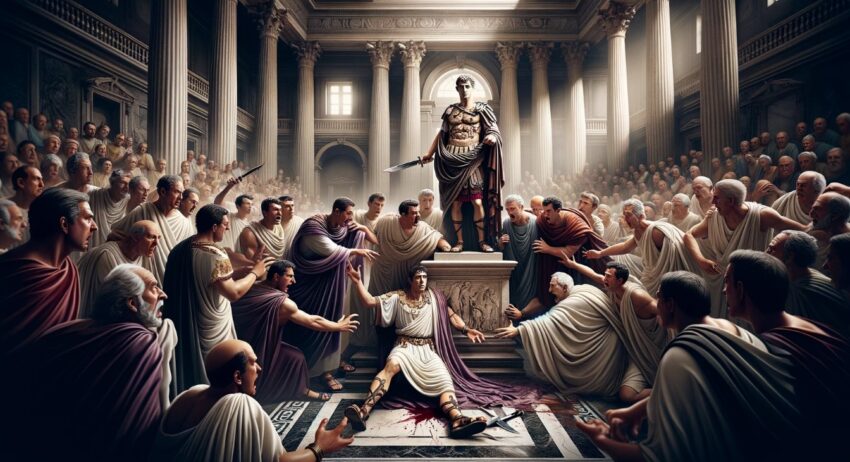Reaction of the Senate and the Roman Public
The reaction to Julius Caesar’s assassination was immediate and deeply divisive, both within the Senate and among the Roman public. Historical accounts provide varied perspectives on how different factions and individuals responded to the shocking event.
In the Senate, the initial response was one of panic and confusion. According to Suetonius, many senators fled the scene in fear, unsure of whether the violence would spread or if more attacks were planned. The conspirators, led by Brutus and Cassius, attempted to present the assassination as a noble act, aimed at restoring the Republic’s freedoms. They proclaimed themselves ‘Liberators’ and expected to be hailed as heroes who had saved Rome from tyranny.
However, the public reaction was far more complex and less favorable to the assassins than they had anticipated. Plutarch notes that the immediate aftermath saw a mix of fear, mourning, and anger among the populace. Caesar had been immensely popular with the lower classes, the soldiers, and many common citizens who benefited from his reforms and generosity. As news of his death spread, Rome was gripped by an atmosphere of uncertainty and unrest.
Appian describes how the public’s initial shock soon gave way to outrage. When Caesar’s will was read, revealing generous bequests to the people of Rome, the mood turned decidedly against the conspirators. The will stipulated that every Roman citizen would receive a substantial sum of money, and that his gardens along the Tiber would be made public parks. These gestures posthumously bolstered Caesar’s image as a benevolent leader, further inflaming public sentiment against those who had killed him.
The climax of public reaction came during Caesar’s funeral, as detailed by Dio Cassius. Mark Antony, seizing the moment, delivered a powerful oration that swayed the masses. Antony’s speech, which highlighted Caesar’s accomplishments and his concern for the common people, incited a riot. The crowd, driven by grief and anger, sought out the assassins, forcing many to flee Rome to escape retribution.
Historians like Livy emphasize the long-term impact of Caesar’s assassination on Roman society. The event did not lead to the restoration of the Republic as the conspirators had hoped. Instead, it plunged Rome into a series of civil wars, ultimately paving the way for the rise of the Roman Empire under Augustus. Caesar’s death highlighted the deep divisions within Roman society and underscored the volatile nature of its politics.
Nicolaus of Damascus, writing from a slightly different perspective, also underscores the fear and chaos that gripped the city. He notes that many of Caesar’s supporters, particularly his veteran soldiers, viewed the assassination as a direct attack on their own interests and status, further polarizing the city.
In summary, the reaction to Caesar’s assassination was a mix of immediate panic in the Senate, widespread grief and anger among the public, and long-term political upheaval. The varied responses reflected the complex social and political fabric of Rome at the time, illustrating how the death of one man could resonate through every level of society and change the course of history.
 |
 |
 |


